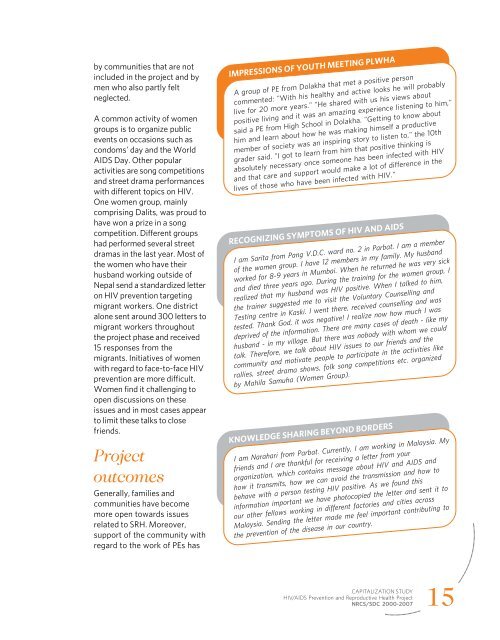HIV/AIDS Prevention & Reproductive Health Project
HIV/AIDS Prevention & Reproductive Health Project
HIV/AIDS Prevention & Reproductive Health Project
Create successful ePaper yourself
Turn your PDF publications into a flip-book with our unique Google optimized e-Paper software.
y communities that are not<br />
included in the project and by<br />
men who also partly felt<br />
neglected.<br />
A common activity of women<br />
groups is to organize public<br />
events on occasions such as<br />
condoms' day and the World<br />
<strong>AIDS</strong> Day. Other popular<br />
activities are song competitions<br />
and street drama performances<br />
with different topics on <strong>HIV</strong>.<br />
One women group, mainly<br />
comprising Dalits, was proud to<br />
have won a prize in a song<br />
competition. Different groups<br />
had performed several street<br />
dramas in the last year. Most of<br />
the women who have their<br />
husband working outside of<br />
Nepal send a standardized letter<br />
on <strong>HIV</strong> prevention targeting<br />
migrant workers. One district<br />
alone sent around 300 letters to<br />
migrant workers throughout<br />
the project phase and received<br />
15 responses from the<br />
migrants. Initiatives of women<br />
with regard to face-to-face <strong>HIV</strong><br />
prevention are more difficult.<br />
Women find it challenging to<br />
open discussions on these<br />
issues and in most cases appear<br />
to limit these talks to close<br />
friends.<br />
<strong>Project</strong><br />
outcomes<br />
Generally, families and<br />
communities have become<br />
more open towards issues<br />
related to SRH. Moreover,<br />
support of the community with<br />
regard to the work of PEs has<br />
IMPRESSIONS OF YOUTH MEETING PLWHA<br />
A group of PE from Dolakha that met a positive person<br />
commented: "With his healthy and active looks he will probably<br />
live for 20 more years." "He shared with us his views about<br />
positive living and it was an amazing experience listening to him,"<br />
said a PE from High School in Dolakha. "Getting to know about<br />
him and learn about how he was making himself a productive<br />
member of society was an inspiring story to listen to," the 10th<br />
grader said. "I got to learn from him that positive thinking is<br />
absolutely necessary once someone has been infected with <strong>HIV</strong><br />
and that care and support would make a lot of difference in the<br />
lives of those who have been infected with <strong>HIV</strong>."<br />
RECOGNIZING SYMPTOMS OF <strong>HIV</strong> AND <strong>AIDS</strong><br />
I am Sarita from Pang V.D.C. ward no. 2 in Parbat. I am a member<br />
of the women group. I have 12 members in my family. My husband<br />
worked for 8-9 years in Mumbai. When he returned he was very sick<br />
and died three years ago. During the training for the women group, I<br />
realized that my husband was <strong>HIV</strong> positive. When I talked to him,<br />
the trainer suggested me to visit the Voluntary Counselling and<br />
Testing centre in Kaski. I went there, received counselling and was<br />
tested. Thank God, it was negative! I realize now how much I was<br />
deprived of the information. There are many cases of death - like my<br />
husband - in my village. But there was nobody with whom we could<br />
talk. Therefore, we talk about <strong>HIV</strong> issues to our friends and the<br />
community and motivate people to participate in the activities like<br />
rallies, street drama shows, folk song competitions etc. organized<br />
by Mahila Samuha (Women Group).<br />
KNOWLEDGE SHARING BEYOND BORDERS<br />
I am Narahari from Parbat. Currently, I am working in Malaysia. My<br />
friends and I are thankful for receiving a letter from your<br />
organization, which contains message about <strong>HIV</strong> and <strong>AIDS</strong> and<br />
how it transmits, how we can avoid the transmission and how to<br />
behave with a person testing <strong>HIV</strong> positive. As we found this<br />
information important we have photocopied the letter and sent it to<br />
our other fellows working in different factories and cities across<br />
Malaysia. Sending the letter made me feel important contributing to<br />
the prevention of the disease in our country.<br />
CAPITALIZATION STUDY<br />
<strong>HIV</strong>/<strong>AIDS</strong> <strong>Prevention</strong> and <strong>Reproductive</strong> <strong>Health</strong> <strong>Project</strong><br />
NRCS/SDC 2000-2007<br />
15

















